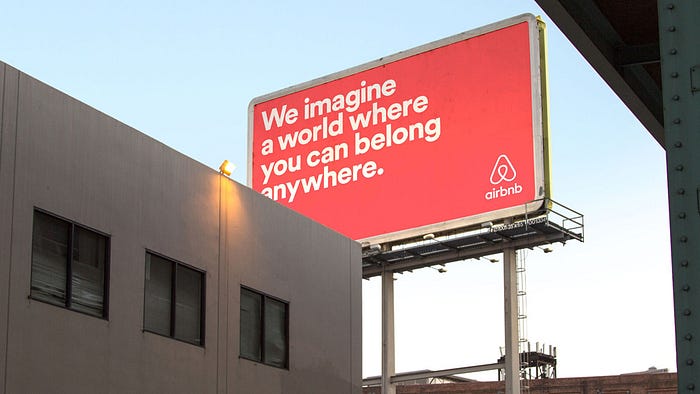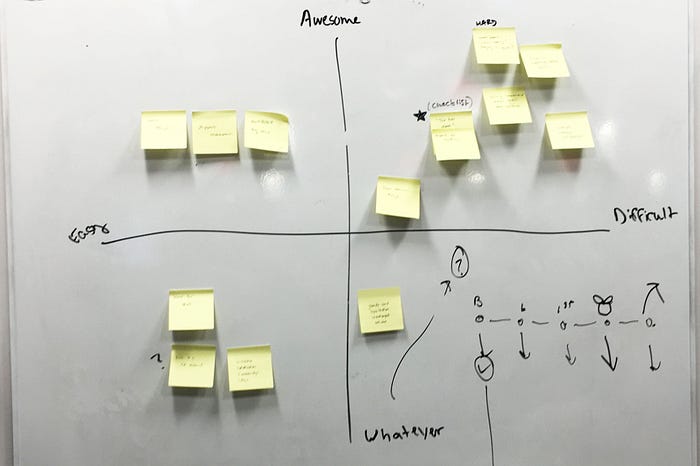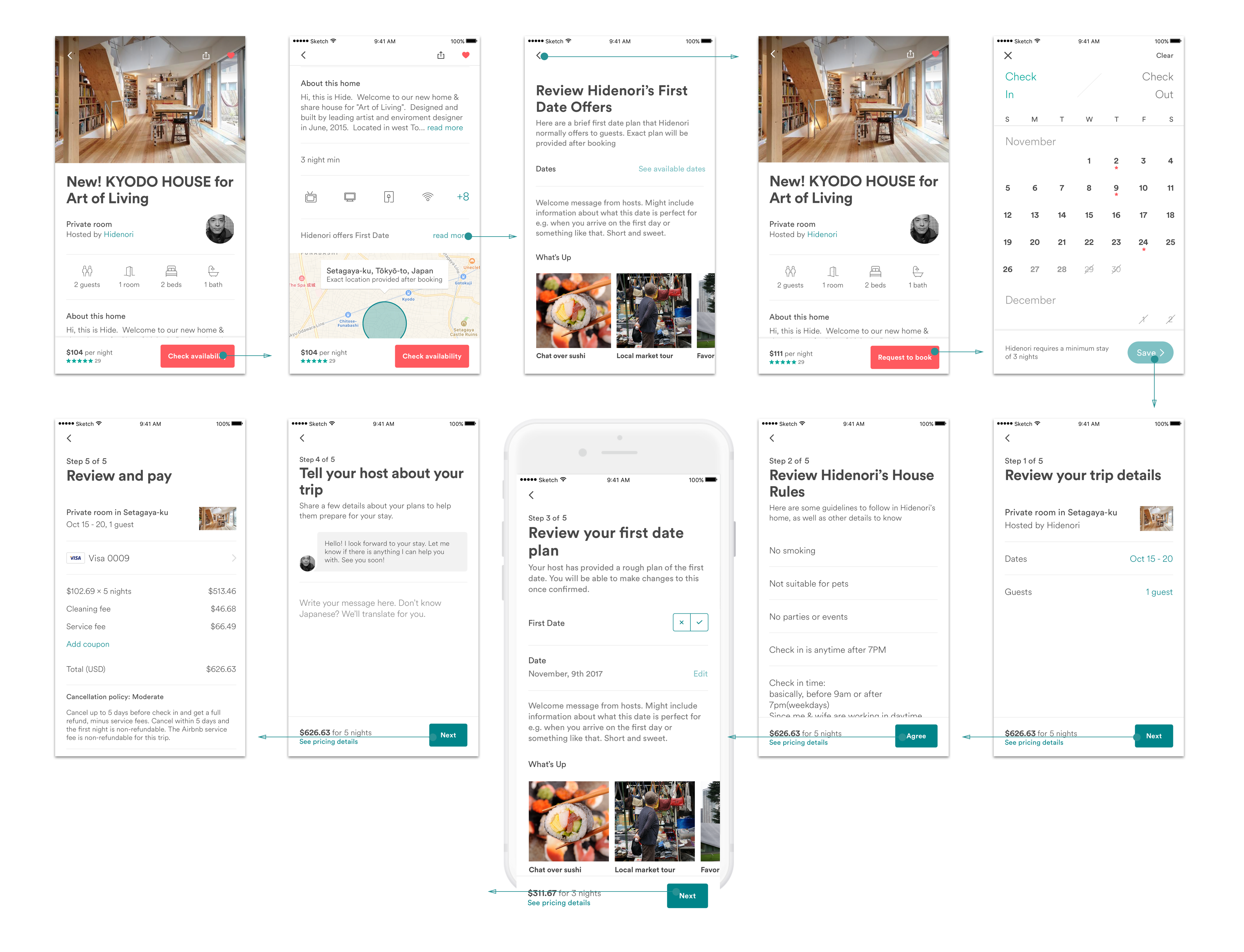Airbnb Concept: First Date
Explore your host’s favorite… with your host
This is a case study I did out of interest. I am in no way affiliated with Airbnb.
Meet Jacob Lee.
Jacob is a full-time Accountant from New York City. He has always been interested in Japanese culture and is planning a trip to Tokyo, Japan. He wanted to learn more about Japanese culture and what Japanese people do in their everyday lives. He went on Airbnb to look for places to stay, where he can also hang out with his host. He searched through the listings, picked his favorite one, got super excited to be spending his time there. However, when he got to his Airbnb, he found that the host was rarely at home and he felt uncomfortable asking if the host could show him around.

Not only Jacob who faces this problem, several Airbnb users I met during my trip to Japan have experienced similar situations. “Interactions with hosts” is like a “hidden decision metric” when guests decide on a listing on Airbnb. They often realize that they wanted that after they arrived at the place.
The core idea behind Airbnb is Belonging. And the core idea behind belonging are meaningful relationships.

“You see, a house is just a space, but a home is where you belong.” — Brian Chesky, Co-founder of Airbnb.
IKEA’s survey found that 48% of respondents defined home as “where I have my most important relationships”
Also, what differentiates Airbnb from other travel accommodations is actually being able to actually live like a local. Is the host not the local expert here?
So, how might we build a relationship between hosts and guests?
Ideation
Figuring Out What Features to Develop
I brainstormed with my friend, Sahil Khoja, to explore possible ideas. After that, we made a graph including the ideas to identify valuable ones.


I then focused on the ideas in awesome-difficult section because those are the riskiest, but are potentially valuable.

I also found that the ideas we came up with tackle different touch points in the ideal end-to-end travel experience. I decided to tackle the “before” phase because that influences the development of the relationship between a host and a guest during the stay most.
At the end, I narrowed down to three potential ideas:

Which Idea Actually Solves The Problem?
After determining the ideas to explore, I hand-sketched them to visualize the concepts and conducted user interviews to find out whether they solve the problems and which idea is worth pursuing most.
Idea 1: Bingo — Breaking the Ice Before They Meet

The goal of the game is not to get a Bingo, but for them to start a conversation so they don’t find it awkward to build a relationship. Here is how it works:
- Once the booking is confirmed, the pre-filled Bingo Interest Board of both the guest and the host will be shared on their profiles and “Play Bingo” button will appear on their inbox.
- After both click “Play Bingo”, the game will start. Each has 5 minutes to answer each other questions about their interests. (Ice breaker!)
Idea 2: First Date — Get It Right Since The First Time


The core idea behind this concept is to make sure that the host gets everything right since the first day, so things don’t go wrong before they build a relationship. The First Date page will include:
- Hosts’ directions will be presented as a “checklist” instead of a chunk of paragraphs so guests don’t miss it.
- Activities that the hosts are willing to offer e.g. local supermarket tour.
Idea 3: A Digital Gift Exchange

The core idea behind this concept was inspired by how Japanese people have to bring gifts to the hosts upon their visit. Also, in order to give someone a gift, you have to know about that person to a certain extent, so it indirectly encourages them to start a conversation. Here is how it works:
- Once the booking is confirmed, a countdown to the “Gift Exchanging” day will appear in their inbox.
- They are then expected to talk to each others and exchange their interests.
- On the “Gift Exchanging”, they can choose a digital gift from the system e.g. in a form of gif/illustrations and can customize messages.
Key findings:

Iterations
After synthesizing the insights, I re-iterated on the concepts to alleviate the weaknesses and highlight the strengths.
Idea 1: Bingo x Digital Gift


After testing, I decided to remove the gamified portion of the concept and replaced it with an automatic matching process by the system. I tackled the weakness of this idea, which is the awkwardness if they don’t share a common interest, by diverting their focus from “not sharing common interests” to “they can share amazing stories because they are different” (above right).
Idea 2: First Date (Highlighting What The Host Offers)

The main weakness of this idea is that it can be too much of a hassle for the hosts, so this feature will be optional for both the host and guest. I also found later that guests are often very tired from traveling on the first day and the common check-in time is relatively late (4pm), meaning that there won’t be much time and energy for them to spend time together. I decided to redirect the core idea to it being the “First Date” — to focus on them spending quality “living like a local” time together.
Building relationship face-to-face rather than through screens
I tested and settled on the First Date idea for two main reasons:
- This idea focuses on building relationship face-to-face rather than through screens
- Nice gestures and cues about how much time the host is willing to spend time with the guest. If a host offers this, it’s clear that a host is willing to show the guests the “living like a local experience” and it’s not too pushy.
Develop
Where in the “before” process will First Date fit into?
Guests are often not aware of their expectations to interact with hosts until they arrive at the place. Therefore, one of the main challenges I tackled while developing the flow was to make sure that the feature is prominent to users during the reviewing and booking process.
The guests are often not aware of their expectations to interact with hosts until they arrive at the place

As shown in the diagram above, users can review the First Date plan before they start booking (as a part of the decision metrics) as well as during the booking process, as one of the steps.
Discovery Points Explorations
After knowing where the First Date will fit in the Airbnb experiences, I moved on to exploring different ways guests can discover First Date. This is very important for gaining and sustaining the engagement from hosts. The features have to be discoverable and used by guests, so hosts are motivated to offer and keep improving them.

Final Interaction for Reviewing and Accepting (/Declining) First Date offer During the Booking Process

Other Use Cases: What can go wrong?
After developing the flow, I tested it based on this question: “What can go wrong?” to identify edge cases. One common edge case I discovered was:
A guest has some kind of restrictions e.g. food and want (/need) to request changes to the plan.
Just like when you are meeting a new friend for the first time, you don’t want to end up taking a friend who can’t eat beef due to religious restrictions to a local steak restaurant.
After interviewing, I found that some guests don’t review their trip plans until the day before or even the day of traveling. This means that if they want to make changes, the host might not have enough time to prepare. Therefore, it is important that the guests are aware of the plans and inform any changes ahead of time.
Scheduling a Friendly Reminder, Keep it Conversational
I quickly brainstormed ideas and decided to settle on the idea of host scheduling a friendly reminder (shown on the right) through their inbox. This is because inbox is already used as the main contact medium (and the message also goes to the guest’s email inbox). This increases the chances of guests seeing the message and reacting upon it.

What’s in it for Airbnb?
After developing this case study, I realized that there are many opportunities spaces where Airbnb could work on to become an end-to-end “live like a local” experience provider.
- Increasing Competitiveness Among the Hosts: There are competition among the hosts to provide better services. If a group of hosts start offering this, others will follow to maintain the competitiveness.
- Differentiating Services: More meaningful host-guest relationships development would help differentiate Airbnb from other travel services, thus increase Airbnb’s competitiveness in the traveling and hospitality industries even more.
- Bridging the Gap between Experiences and Homes
Conclusion
Overall, I am happy with what I came up with for this project, especially when it is something I developed from the insights I unexpectedly discovered from traveling and interacting with people.
Key Takeaways
- When designing for two target groups of audience on different sides of the platform, our tool needs to help both sides be considerate about each other.
- When designing for a global product, cultural differences need to be prioritized. After I finished the sprint and shared ideas with more people, I realized that the term “First Date” can be viewed differently for people from different countries.
- Finding the right people to test the ideas with is very important for valuable insights. I didn’t have access to the group of people I met in Japan to test the idea throughout, so I ended up spending a large amount of time searching for the “right” people on campus to test with.
Update (September 2018):
I’ve iterated on this idea based on the feedback I received and the further research I did. Check it out here!


